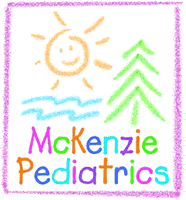Eczema Do's and Don'ts
Eczema Do’s and Don’ts
McKenzie Pediatrics
2019
The “Do’s”
- Cleanse skin daily (shower best, or bath with shampoo last) with lukewarm water and a gentle liquid cleanser such as Vanicream Free and Clear, Dove Baby, CeraVe body wash, and others
- Pat the skin dry, rather than hard rubbing
- Within 3 minutes of getting out of the shower or bath, lock in the moisture in your skin with a moisturizing cream (NOT lotion), such as Eucerin, Aveeno, or CeraVe. If advised by your doctor, instead use a medicated steroid cream (in times of flare-ups)
- Stay hydrated with water throughout the day.
- During the dry summer months, and during the cold winter months when we’re heating up (thus drying out) our homes, consider using a cool mist humidifier in your child’s bedroom.
- Consider an occasional bleach bath to kill unwanted bacteria in areas of the skin involving eczema. Talk to your doctor about when to do this, and how.
- Consider a daily probiotic (particularly one with Lactobacillus rhamnosus), which benefits skin health
- Eat lots of fruits and vegetables, organic whenever possible. Focus on fruits and vegetables that contain high amounts of Vitamin C (citrus fruits, red bell peppers, melons, etc.)
- Use high thread-count soft cotton sheets and pillowcases. Avoid flannel, “tee-shirt” sheets, and wool.
- The same goes for clothing. Cotton is best. Especially with regards to pajamas. And make sure clothing is loose-fitting, not tight.
- Consider discussing allergy testing with your child’s doctor. In some, but not all, cases eczema is triggered by environmental allergens (such as pollens, danders, and dust mites). Outside of the infant and toddler period, foods are an uncommon (though still possible) trigger of eczema.
- Consider a daily antihistamine (such as non-sedating Zyrtec/Allertec) to ease or eliminate the itch. Remember, eczema is “the itch that rashes”; the more a child rubs or scratches, the worse his or her eczema will become.
The “Don’ts”
- Avoid anti-bacterial bar and liquid soaps whenever possible. Be aware that such harsh soaps are usually used in daycares, schools, and public restrooms
- Avoid hand sanitizer whenever possible
- Avoid play (unless gloves are on) with Slime, PlayDoh, or Kinetic Sand
- Avoid hotel soaps and lotions. Hotel towels were probably cleansed with harsh chemicals, so consider bringing your own.
- Avoid perfumes and dyes and synthetic “fragrances” in detergents, fabric softeners, hand soaps, dish soaps, and lotions.
- Be aware that even “natural” products with “natural” plant oils still might be irritating to skin with eczema. Test small areas at first.
- Avoid DEET-containing insect repellants
- Avoid traditional sunscreen (such as Coppertone™ or Banana Boat™ brands). Use mineral-based sunscreens, but try on small areas at first to make certain they don’t irritate
- Some children with eczema need to avoid chlorinated pools. Limit the time in a public pool at the first swim of the summer, to make certain your child’s eczema isn’t aggravated by the chlorine (and other chemicals, such as sunscreen) in the pool.
